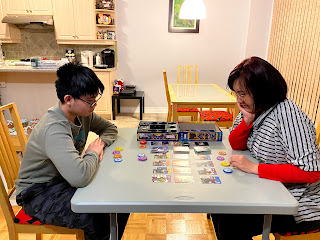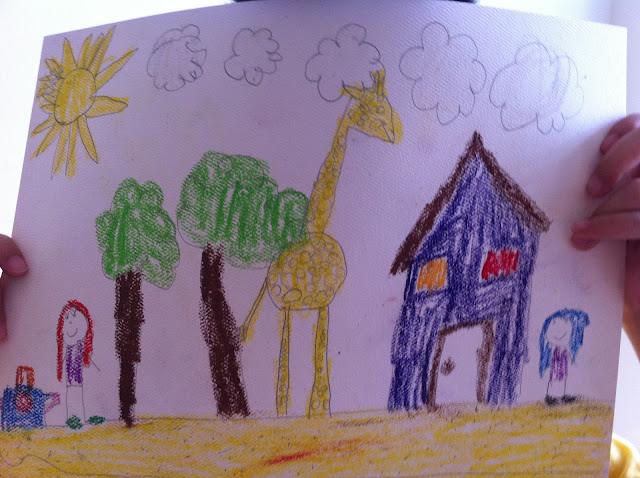Transition Year for Parents: High School
Most of us want to learn about how to prepare for pregnancy, labour and delivery, the first years, etc., but it is curious to me that the older our kids get, the less people share about the journey.
On the one hand, that is a welcome reality - less unwanted advice and less overt judgment - but on the other hand, it gives me the false impression that things get easier as the year progress.
Does it? Does it get easier?
Why don't people talk much about parenting as the years go by? Are we just exhausted? Or have we just given up? Or perhaps, in a way, many of us are just surviving or worse yet, preparing for the worst and hoping for the best (not what I put first)?
At any rate, as my kids grew (and they all do, by the way), I started asking questions from everyone willing to listen: teachers, principals, neighbours, and friends about advice on what I might need to keep in mind as we transition to a new stage: High School and adolescence.
What I got from a lot of people startled me. It seemed like a lot of people just told me to hold onto my seat, fasten on the seat belt, maybe 'pray' (but for what?) and hope for the best. I felt the message by many was for me to be ready for a period of time where kids would begin to say less and less, and to 'not take it personally' and to give them room.
Striking a balance
What does that mean, as a mother? How do you give teens the room they need? Do they just miraculously figure things out? How do you strike a balance?
The wake up call was at one of the presentations we attended at my son's new High School. There were a lot of things said and a lot of new information to digest, but one thing stood out for me. The teacher said, "most parents let go during the High School years, but these are the years you really have to stay in touch with your kids and their journey in High School."
It is now March and my son has been in High School for around 7 months. I started inquiring about this transition when he was in Grade 7 (two years before high school) and so far, these are things I have observed:
The transition is real
Everyone talks about 'transition' but it was hard for me to grasp what was there to transition from. Of course, I could imagine the obvious changes: schools get bigger, schedules are different, hormones kick in at full speed, but what else?
What I found is that the transition is actually much more than the obviously observable changes. Every observable change: the school is bigger, there are more teachers, schedules are different, you are expected to reach out for help, etc., meant not only learning the new system and how to navigate through them, but every change had the potential to shake one's identity and self-worth. Every change also highlights the voice inside us that says "you are not ....enough."
In my son's journey, from the get-go, I realized the challenges came often in the form of how tasks and activities were designed, what the expectations were and how my son had to respond to them to show what he knew. It meant sitting down with him to help him study for quizzes in September (how do you study?), assist in developing a schedule and learning to pace a project, and most importantly helping him identify what kind of help he needed. If he could not spell out the problem, he would not really know what help he needed; and if he didn't know what help he needed, he wouldn't know who to get help from!
The transition is for everyone in the family
How could I appreciate the triumphs my son will conquer in his High School years, if I did not become somewhat involved in it? And how could I make sense of it all, if I had no idea what High School is like now? And how could I know more if I did not also engage in a transition?
Transition shook me to the core too. I started questioning what 'helping' and 'supporting' my child mean and what it would look like. How do you 'give them room to learn and discover sometimes, but at other times, step in to push or engage or help them aim higher?
Every family has its rhythm. Not only was this a major transition year for my son; it was for the family. And to add to it all, the pandemic strikes and we are all finding it a little extra challenging. What does work time after school look like? How do you check that they are not slacking off? How do you avoid developing a rhythm where everyone in the family is just cooped up in their own rooms doing work? How do you make sense of what they may tell you about school?
I started connecting with people at the school. I know it was intimidating but I kept on reminding myself this was fair - my son was learning and I could learn alongside with him. I am telling him "it's ok to ask" but when I ask, I realize it is not as 'ok' as I thought
Nevertheless, I asked. I introduced myself to teachers, support workers, principals. I joined parent meetings. I tried. There were times I just didn't but when I did click with someone, I seize that opportunity and asked. I listened. And I asked more. I paused them when they threw a bunch of High School jargon I had no idea about. I paused them when I felt my head explode; and in all circumstances, they all appreciated my reminding them that not everyone is born knowing this vocabulary!
Be there, but don't be there
As the weeks progressed, and I saw proudly how my son adjusted or was beginning to adjust, I realized I needed to sometimes be there but not be there. By November/December, I began to really believe in the value of not just saying "they are mature and I don't have to worry about them." That is missing the whole point.
Family is not about caring when there is something to worry about.
My goal is not to only step in when there is trouble.
But as I saw my son transition, I began to see that my role sometimes was just to be support, be the cheerleader, be the sounding board, or just be the one liaising with some staff to give them context. I never lied to my son, and he knew clearly that I had a direct line to people in his life in his High School, but he did not seem to mind that; he seemed to appreciate that instead.
The hardest thing for me was to be there, but not be there. I am a doer. When I solve a problem, I am in the lookout for another problem. Learning to break this unhealthy pattern and learning to simply respond as my son needed or to just give 'heads ups' to people in his life meant to be more subdued, quiet but still purposeful. It meant and it required more discerning and wisdom; and it stretched my love and forced me to practice humbleness. Working behind the scenes is not my forte.
Listen and See Potential, not Achievement
I blogged earlier about what I have been learning about the need for us parents to take a hard and honest look at our listening skills, especially as our kids age. I think when our kids were well, kids...we listened. And perhaps the motivation was that it felt like they needed our listening more. As they grow, somehow we develop this idea that they should listen to us more. Why do we do that? Is it because unconsciously we feel there is a time to listen and a time to be listened to? All those years we think we have been listening to them, have we really been listening?
As we transitioned, it became very clear to me that part of the transition was to realize changes were not just observable changes in school, in their physical body and in their age. Their worldview was changing and their thoughts and feelings were changing too. Their language was changing too.
 Learning to listen to that, and learning to share my thoughts without dictating how they should think or feel is one of the hardest things. I am Learning to see a young man or woman develop in front of my eyes and the potential they have. What I do best is to see what they should do and should not do, but seeing potential and being curious enough to wonder where the potential may lead them? That is hard. I function well with the knowns. Seeing potential rather than achievement doesn't make sense at first. But as I started exercising those 'listening muscles' I realized I started to not feel I had to do or fix. When I stopped doing and fixing, I was able to listen and see. And when I listened and saw, what I heard and saw were fascinating insights, interesting thoughts, and sometimes heartbreaking truths. All of those things were shaping my now child soon to be man. He needed me to tell him what I saw so that that he could make sense of them. He needed me to hear him out, in a world that is saying and pushing for him to fit in, to be this and that and to conform.
Learning to listen to that, and learning to share my thoughts without dictating how they should think or feel is one of the hardest things. I am Learning to see a young man or woman develop in front of my eyes and the potential they have. What I do best is to see what they should do and should not do, but seeing potential and being curious enough to wonder where the potential may lead them? That is hard. I function well with the knowns. Seeing potential rather than achievement doesn't make sense at first. But as I started exercising those 'listening muscles' I realized I started to not feel I had to do or fix. When I stopped doing and fixing, I was able to listen and see. And when I listened and saw, what I heard and saw were fascinating insights, interesting thoughts, and sometimes heartbreaking truths. All of those things were shaping my now child soon to be man. He needed me to tell him what I saw so that that he could make sense of them. He needed me to hear him out, in a world that is saying and pushing for him to fit in, to be this and that and to conform.Surround yourself with cheerleaders
Let's be honest - the High School years are a series of roller coaster rides .
.
There are times when you panic and think you are about to die. There are times when the view from above is breathtaking, only to be followed by a downhill so steep you forget who you are and wished you had never engaged and hopped onto this ride. There are times when the turns and curves are sudden and others where you could see them coming a mile away - either way, nothing really prepares you for the thrill, and the threat of it all. You smile, you yell, you tear up and you clinch so hard your hands hurt. From afar, people don't know if you are really happy, sad or scared.
But one thing I noticed when I am on a roller coaster ride- it is always better when you go with someone else, and it is best when the people you are with cheer on and yell out loud. Actually most of the people on the ride are strangers at first but by the end of the ride (which feels too long during the ride and too short afterward) you look at each other and you know you have shared an experience together
Surround yourself with cheerleaders. You will need them. Go find them. If there are people in our sphere of influence that can be that reminder to you of what is good in life and in you, recruit them. If you don't have those people, find them in the new world you are in - new teachers, new parents, new friends and neighbours. And if you really can't find anyone - YOU CAN. You can be your own cheerleader. After all, it is a lot of work to hop onto this ride with your child. It takes everyone out of you and there will be days when the sweat and tears are so real you will need that cheerleader.
I am by no means at the end of the ride; in fact, I am just beginning the ride. But unlike what I heard from others, I choose to engage. I don't think we are meant to sit idling on the sidelines waiting for our kids to get through these years and crossing our fingers and hope they turn out ok. Engaging might require a lot of work on our part; not to 'fix' them, but to hop onto the ride and find new ways to engage. It will require us to have honest looks at where we place our value, what drives us to engage with our kids, and how we see and listen to them. Yes, it is hard work, and it is work that will sometimes tear us down, but in the end, that is what living out loud is all about.








Comments